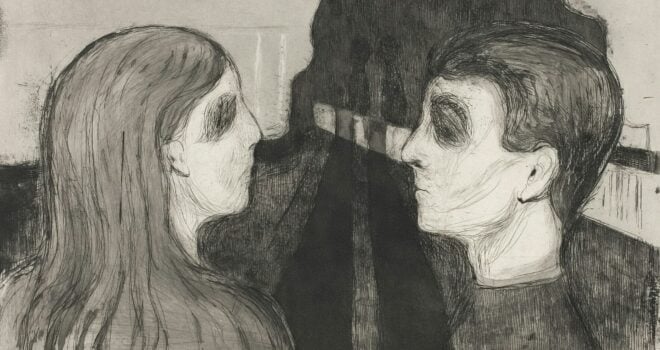Envy is the second of the Deadly Sins. It is particularly deadly because it is linked with pride, ranked first among the Deadly Sins. Envy is sorrow at another’s good fortune. A proud person cannot bear the fact that someone else is better that he is in some way. Envy flows from pride. A person who thinks too highly of himself feels that another person is robbing him of his illusion of superiority.
Just as envy is rooted in pride, it is also a root of anger. A proud person is envious of others and that makes him angry. And so, the first three of the Deadly Sins combine to form a highly combustible disposition. Envy, nonetheless, is as prevalent as it is poisonous. It is ruinous to the soul.
Envy is played out between the sexes in a way that prevents men and women from becoming happy. Sigmund Freud, to his everlasting discredit, characterized women as suffering from “penis envy.” Female psychologists fought back and characterized men as suffering from “womb envy,” introduced by German American psychoanalyst Karen Horney, indicating that men might envy women’s reproductive capabilities, especially motherhood. As a consequence, Horney argues, men strive to compensate through creative activities. Several other academics, especially feminists, supported the theory of “womb envy” and turned Freud’s theory upside down.
In the Broadway musical Annie Get Your Gun, Annie and Frank spar with each other in a comic mixture of envy and pride: “Anything you can do I can do better, I can do anything better than you (Frank). No, you can’t (Annie). Yes I can (Frank). No you can’t (Annie),” and so on. Envy is common, and sometimes comical, but it gets people nowhere.
If we replace envy with admiration, we get a different picture, one that does not keep the sexes apart, but actually unites them. Consider the words of the great Hungarian prelate, Cardinal Mindszenty:
The most important person on earth is a mother. She cannot claim the honor of having built Notre Dame Cathedral. She need not. She has built something more magnificent than any cathedral—a dwelling for an immortal soul, the tiny perfection of her baby’s body.
Here, the Cardinal is not merely being chivalrous, but annunciating something that a mother has experienced. The American journalist and social activist, Dorothy Day, has this to say concerning her own motherhood: “If I had written the greatest book, composed the greatest symphony, painted the most beautiful painting or carved the most exquisite figure, I could not have felt more the exalted creator than I did when they placed my child in my arms.”
It is clear enough that Mrs. Day does not envy men. She is as happy as can be in her divinely blessed motherhood. When the troubadours sang their ballads to their fair damsels, it was not because they envied them, but because they were inspired by the feminine beauty they perceived. Men write poems to their ladies, not because they are motivated by envy, but because they were being true to their affection.
The fundamental problem with “penis envy” and “womb envy” is that in both instances, the whole person is lost. Only a fragmented person would be driven by a mere part of his body. Love is not something of the glands. It is an expression of the whole person. And it is precisely the whole person who experiences happiness. Envy and the other six Deadly Sins stand in the way of happiness because they are essentially despotic. They represent the phenomenon of the part rising up to overtake the whole.
This despotic activity of the part has been employed time and again in horror movies. The disembodied hand, for example, featured in several films, acts on its own and terrifies people. Frankenstein’s monster operates without a heart as do zombies and other creatures that lack wholeness.
In Plato’s Symposium, the idea is put forth that human beings at one time were androgynous, that is, a unification of both the male and the female. Then, according to the hypothesis, this being was cut in half, bisected (which is the etymology of the word “sex”) into the male and the female. Love, then, is the search for one’s missing part. The male searches for the female and vice versa.
The Christian model is close to what we read in the Symposium. The difference is that Christians do not believe that our soul was once bisected, and we now seek to be reunited with our missing part. Christians believe that the two sexes do belong to each other, but not as the reunion of wholeness, but as complementary individuals who are destined to be united in love. This complementarity, however, cannot be realized without mutual respect for each other’s differences. In other words, they must admire what is unique in each other and refrain from any hint of envy.
Envy is counterproductive. By envying another’s good fortune, we neglect the development of our own personalities. Furthermore, envy is blind. We may envy another because of his superior musical skills, for example, but we have no idea of the pains and problems that other person is experiencing. Avoid envy. Admire the accomplishments of others with an open heart. A mutual admiration society is not a bad idea. In fact, it is a road to happiness.
Photo by Art Institute of Chicago on Unsplash
















